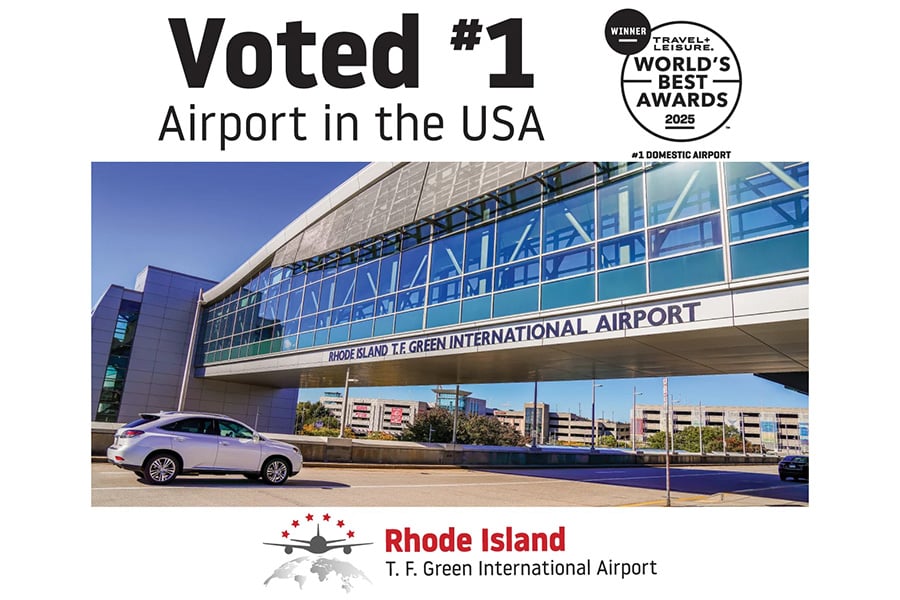New Docuseries from Award-Winning Filmmaker Will Showcase Rhode Island’s Ocean Life
The first seasonal installment of “Ocean State” will air on PBS on Jan. 9.

Salt marshes are among the habitats featured in the new series “Ocean State.” (Photo by Tomas Koeck/Silent Flight Studios)
Editor’s note: This article was updated from a previous version to reflect the series release date of Jan. 9.
On a foggy day off Montauk, a boatful of fishermen keep a close eye on their lines.
As the camera rolls, one of the lines catches and the reel begins to spin. A young man in sunglasses and a T-shirt leans down close to the water as the predator at the other end swims alongside the boat.
“It’s a spinner! It’s a spinner!” he shouts excitedly to his colleagues, indicating they’ve caught a spinner shark.
It’s not a scene from a fishing tournament, though the footage will eventually make its way to TV. The fishermen are volunteers and researchers with the Wakefield-based Atlantic Shark Institute, tagging sharks as part of a study led by University of Rhode Island graduate Jake Beretta.
The footage is part of a short called “Chasing Fins,” released in August as a pilot episode of a larger series set to hit airwaves this Friday, Jan. 9. “Ocean State,” produced by Silent Flight Studios with the support of Ocean State Media and other partners, will explore Rhode Island’s diverse marine habitats and wildlife, focusing on the ecosystems that exist just offshore.
“This is meant to be a love letter to the Ocean State in more ways than one,” says Tomas Koeck, director of the series and founder of Silent Flight Studios.
To make the series, Koeck partnered with various environmental organizations, including the Atlantic Shark Institute, the Nature Conservancy, Block Island Maritime Institute and the Planet Fuel Charitable Fund. The series highlights the conservation work happening in Rhode Island waters, with each episode focused on a different type of marine habitat.
“We’re going to be focusing on all the different parts of the oceanic environment,” Koeck says.
“We’re looking at all these environments together and showcasing, ‘How does Y have to do with X? How does research that the Atlantic Shark Institute does have to do with ocean health?’”
The ASI is one of several organizations looking at how changes in the marine environment affect local wildlife. Executive Director Jon Dodd founded it to conduct shark research and support conservation efforts. The organization has more than fifty volunteers — including boat captains and researchers — who work with partner organizations to conduct studies on the local shark populations.
“We try to answer questions that are not answered. We try to get those answers on behalf of ocean health. They really become important when it comes to policymaking and decision-making, because information is important,” he says.
Dodd and Koeck met several years ago when Koeck was gathering content on the ASI’s work for another one of his documentaries. The Connecticut native and filmmaker has contributed to projects with National Geographic, PBS Nature, the Smithsonian Channel and the National Audobon Society and recently released Flyway of Life, a feature film about the Atlantic Flyway. (For viewers interested in seeing that film, the Audubon Society of Rhode Island hosted a screening in Bristol on Dec. 6.) He moved to Jamestown over the summer to pursue work on the new series about the state’s ocean wildlife.
“Rhode Island has a distinct and really amazing culture,” Koeck says. “When we are out on the water, it’s a lot of fun.”
A typical day of filming, he says, has him waking up at 4 or 5 a.m. for a full day on the water. Koeck and his crew head out with experts from the ASI and other organizations as they search for sharks, striped bass and other critters and habitats to feature in the series. Wildlife filmmaking, he says, is always a gamble, with weather and other factors affecting whether an animal will show up that day.
His favorite content to film highlights the connection between humans and animals, such as when Beretta was thrilled to encounter a spinner shark during his research. Both Koeck and Dodd say they have a special fondness for mako sharks, the same shark that graces the ASI charity license plate on Rhode Island roads.
“I call it the Porsche of the ocean,” Dodd says, adding it can swim up to forty-five miles per hour. “They’re the fastest shark in the world. Can you imagine going that speed underwater with all the water resistance?”
The new series will air in four seasonal installments, beginning with the first episode, “Secrets of the Seagrass,” on Rhode Island PBS on Jan. 9 at 8 p.m. and continuing through 2027. Following the series, an accompanying feature-length film will weave the stories together and offer an overall look at Rhode Island’s ocean life. The film’s release, Koeck says, will be accompanied by an educational screening event in 2027.
Episodes will also be available to stream online at pbs.org. Viewers can learn more about the series at silentflightstudios.org/oceanstate.

Mako sharks are among the wildlife featured in the new series “Ocean State.” (Photo courtesy of Tomas Koeck/Silent Flight Studios)
RELATED ARTICLES
Meet Quint, the Narragansett Shark
Inside the Living Sharks Museum, a Free Shark Lover’s Paradise in Westerly
























